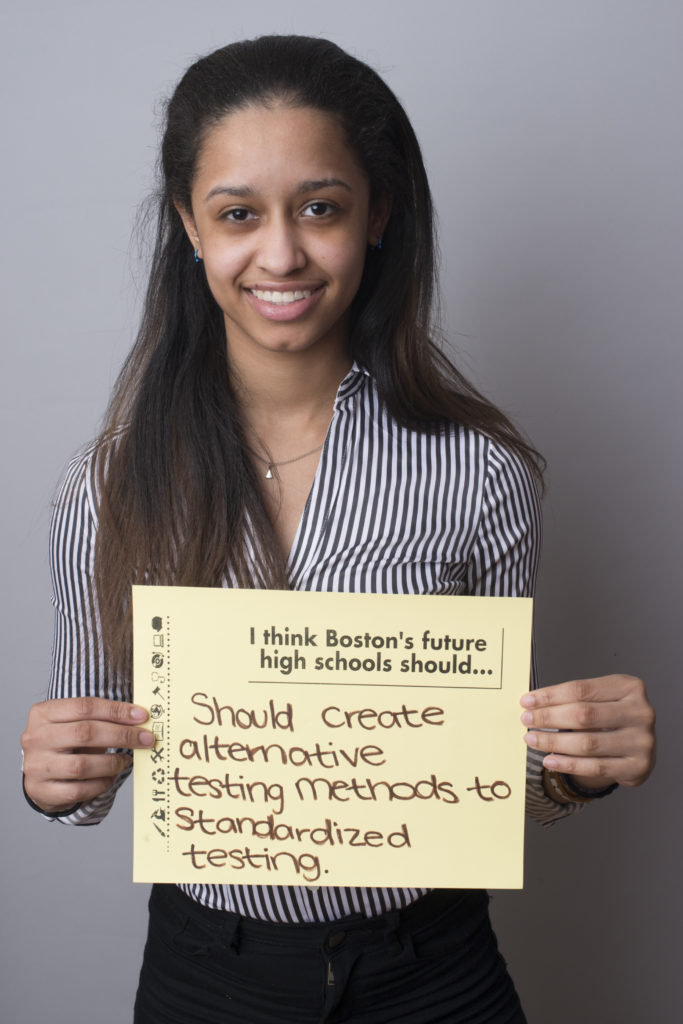
By Yosmali Ferreira
In the morning you walk into school feeling relaxed and ready for the day. But then you find out that you have to take a test in your first-period English class: multiple choice and a few short answers. Your heart starts racing and you get shaky and nervous. Your teacher hands out the tests to the class and announces, “Okay, everyone! This test counts as a big grade and it will let me know if you’ve been paying attention all these months. Do your best! You may begin.”
Personally, I’m the kind of student who does well in class without all the pressure, taking the time I need. I am afraid that doing poorly on the test will tell my teacher that I haven’t been paying attention and do not understand the material. The truth is, I have been paying attention, but taking a standardized test is not a way I can show that. The work I do in class and how I work with others really defines what I know. Standardized assessments, as well as regular, multiple choice tests, are such a big part of our grade that they can determine whether or not we pass a class. I believe they are an incomplete measurement of our intelligence and our learning.
If high school had a different method of measuring how much students are learning, both students and teachers would be better off. Critics of standardized assessments claim they’re not fair and lead to teachers narrowing their curriculum in order to teach to the test. Standardized assessments also tend to limit a student’s creativity and ability to prove what they know and how they learned it.[1]Performance-based assessment is another way for students to demonstrate knowledge, skills, and the material they’ve learned.
I spoke to Lisa Guisbond, the Executive Director at Citizens for Public Schools and an assessment reform analyst at the National Center for Fair and Open Testing (FairTest).
Yosmali: Your focus is on less testing and more learning. What do alternative testing methods mean to you?
Lisa: Well, I know there are examples of schools, both in Boston and in other states, that use things besides standardized tests to assess how students are learning and developing their intelligence and skills.
Some of them are called performance assessments. Instead of sitting down and taking a standardized test which has you choose from a number of suggested answers where your job as a student, is to just figure out what the one right answer is, performance assessments are more about the actual work that you produce when you’re learning. It could be writing a research paper, it could be a science experiment, or doing a speech, a group project, a piece of art – like an actual product that you yourself choose to do. Not something that someone else decided is what you should know, not something that someone else decided what the right answer is. It could be an exploration based on your interests of finding what the answers are and what you think the answers are.
Yosmali: Do you know of any alternate assessment methods that are working really well?
Lisa: Yes. In fact, last March FairTest and another organization I work with called Citizens for Public Schools, co-sponsored a conference at the Mission Hill School on a Saturday. We invited the director of this group of schools called the New York Performance Standards Consortium Schools. This group of schools was able to get a waiver from the state. In New York state kids have to take five standardized tests to graduate from high school, but these schools got released from the requirement and only have to give one of the five standardized tests. The rest of their graduation requirements are based on performance assessments such as research papers, science experiments, analytical English papers and so on.
The Director of the Consortium schools brought along 4 students who went to the same member-school called Urban Academy on the Upper East Side in New York City. I was so inspired by listening to these students. One of them was at the same college that my son went to and he described how challenging it was for him when he first went to Urban Academy. He wasn’t used to that way of learning and that way of doing performance tasks but by the time he went to college he realized how well it prepared him for the kinds of work that you do a liberal arts college where you are in small where you’re reading a lot and you’re discussing with your classmates and the professor. It taught him how to know when he needed help, to know where to get it, to know how to ask and how to feel comfortable talking to adults and professors.
None of these things are really developed in a setting where everything is focused on prepping kids to take standardized tests. It doesn’t develop your critical thinking capacity – it’s just, “I have to pick out that right answer.” They were living models of how successful that approach can be for any kind of student.
- “What’s Wrong With Standardized Tests?” The National Center for Fair and Open Testing, May 22, 2012, http://www.fairtest.org/whats-wrong-standardized-tests. ↑
You must be logged in to post a comment.